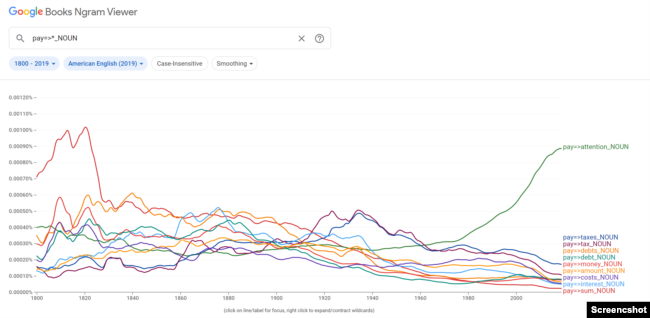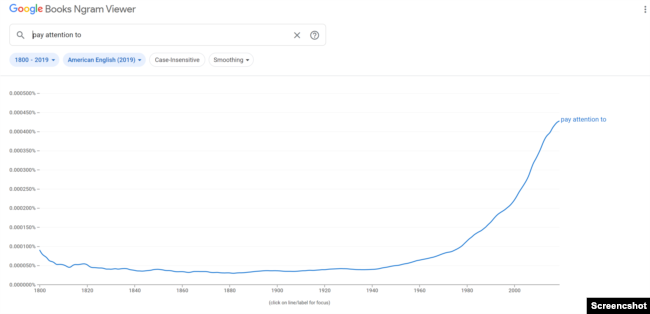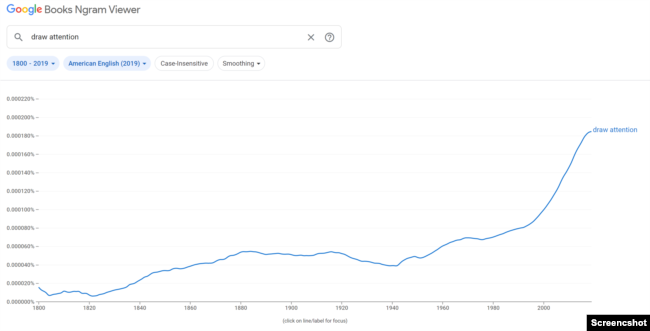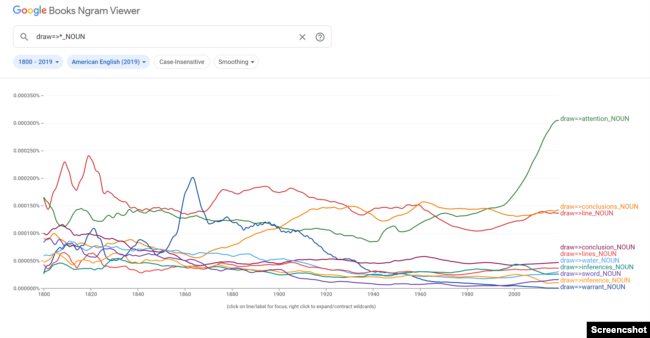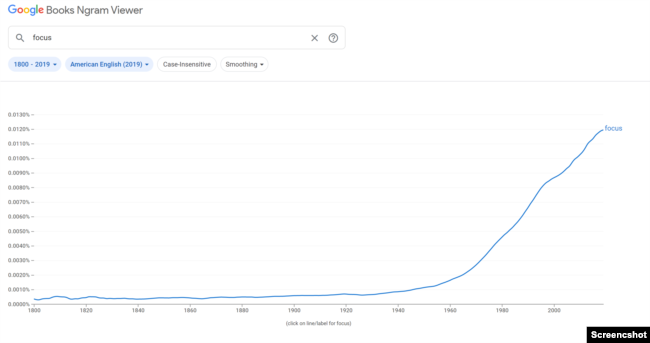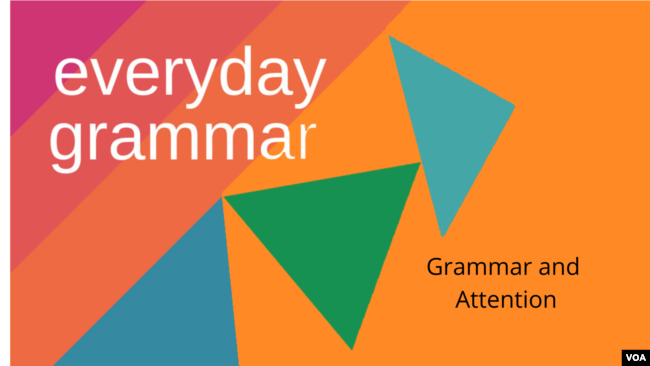Attention の使い方
時とともに、言葉もその使われ方のトレンドが変化するのですね。
今回は"attention" !!
英語の達人になろう!!
Grammar and Attention(和訳)
September 08, 2022
人間の関心は限られた資源であるという考え方である”関心経済”のように、ニュース報道や日常の議論では“attention,” という言葉が使われることが多くなっています。
※attention economy:情報過多の社会において人々の「関心や注目の獲得(アテンションの獲得)」が経済的価値を持ち、貨幣のように交換材として機能するという概念。
1971年に、アメリカの経済学者ハーバート・サイモン(Herbert A. Simon)が情報過多社会におけるアテンション獲得の重要性を提唱。その後、1997年にアメリカの社会学者マイケル・ゴールドハーバー(Michael H. Goldhaber)が、情報爆発社会において仕事のみならず趣味やプライベートの情報もすべて混在してアテンション獲得がビジネスになり、物質的な経済からアテンションに基づく経済へ移行するとしてこの状況を「アテンションエコノミー」と名付けた。
後にこの概念は、2001年にトーマス・ダベンポート(Thomas H. Davenport)とジョン・ベック(John C. Beck)によって出版された書籍『アテンション!(Attention Economy)』によって普及した。
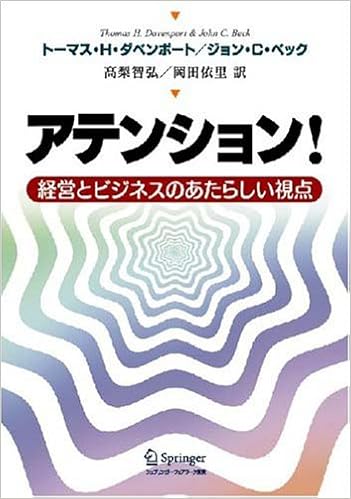 出典:Amazon
出典:Amazon
トーマス・H・ダベンポート (著), ジョン・C・ベック (著)
ーシマウマ用語集より
もしあなたが“attention,” について話したいとしたら、どのように話しますか?どのような用語や構造を使うでしょうか?
本日のレポートでは、“attention,” という名詞と、それに関連するいくつかの用語について探っていきます。アメリカ人が“attention,” について話す最も一般的な方法について学びます。
歴史
Online Etymology Dictionaryには、多くの単語の歴史と意味について記載されています。
それによると、"attention "という名詞は、1300年代後半に始まり、"ある対象やトピックに心を向ける積極的な方向 "という意味を持つことが示唆されています。
また、Online Etymology Dictionaryは、この言葉が "驚くべき多様な動詞とともに使用される "ことを示唆しています。
Pay attention (or pay attention to...)関心をはらう
名詞 "attention" と共によく使われる動詞のひとつに "pay" があります。
動詞の "pay "はお金と結びつくかもしれません。何かのために“pay money” ”お金を払う”のです。例えば、「I paid $100 for this phone."」と言えます。
しかし、現代では、最も一般的な“paying,” の種類は、attentionであることが、GoogleのNgramで示唆されています。
この構造の最も一般的な現れ方は、このように pay attention to です。
GoogleのNgramでは、1980年代に "pay attention to "がより一般的になったことが示されています。その伸びは現在に至るまで(少なくともデータに含まれる最新の2019年まで)続いています。
この変化は、attentionに関する関心が高まっていることを示唆しています。
アメリカ人が "pay attention to... "を使うのは、以下のような場合があります。
毎日ニュースやソーシャルメディアを読んでいる人は、こう言うかもしれません:
I pay attention to the news.
Or
I pay attention to trends on social media.
否定形では、助動詞の "do "を使って、次のように言うかもしれません:
I should have paid attention to my parents.
後悔している場合は、"should "という修飾語を使うこともあります:
I should have paid attention to my parents.
Draw attention (or draw attention to)関心を喚起する
しかし、私たちは "pay attention"(関心を払う)だけではありません。私たちは、誰かや何かに関心を向けさせるという意味の "draw attention "も使えます。
GoogleのNgramによると、近年”draw attention”という構造がより一般的になってきているようです。
また、英語圏の人は、動詞 "draw" を他の名詞と一緒に使うかもしれませんが、動詞 "draw" の最も一般的な使い方は "attention" と一緒に使うことです。
例えば、教師が "I would like to draw your attention to the image on page 37." (37ページの画像に注目してほしい。)と言うかもしれません。
アメリカ人は、名詞 "attention" の前に修飾語を使うことが時々あります。例えば、ある人はこう言うかもしれません。
That social media post drew a lot of attention.
あのソーシャルメディアの投稿は多くの人の注目を集めました。
この場合、「a lot of」は主動詞のdrawと名詞のattentionの間に現われます。
その他の動詞
”attention”は、” attract”、” receive”、” deserve”、” get”、” give”などの動詞と一緒に使われます。
これらの用語の使われ方には違いがあります。“Receive attention” "注目を浴びる "は、ある事実を説明します。例えば、ある出来事が “received a lot of attention." "多くの注目を浴びた "と言うかもしれません。あるいは、その出来事は“received very little attention.” "ほとんど注目されなかった "と言うかもしれません。
その他の構造は、価値について主張するものです。例えば、The structure “deserves attention,” は、これまで注目されていなかったものが、注目されるべきものであることを示唆します。
例えば、ある人はこう言うかもしれません:
This problem deserves attention.
この問題は注目に値する。
Or:
This issue deserves more attention.
この問題はもっと注目されるべきです。
Focus
“attention” に関連する重要な考え方に、動詞(と名詞)の"focus "があります。
"focus "の動詞形は、”関心や努力を何かに向ける”という意味です。
“attention,”という名詞を使う他の構造と同様に、“focus”は過去30年間でより一般的になっていることが、GoogleのNgramで示唆されています。
"Pay attention to "と "focus "は非常に似た意味を持っています。しかし、日常的な場面では、微妙に異なる使い方をすることがあります。
それでも、どちらかを代わりに使えば、おそらく意味は通じるはずです。
まとめ
このレポートでは、“attention” という言葉に、 -それと“focus.”のような、関連するいくつかの考え方に注目していただきました。
今後、ニュースや日常的な議論の中で、“attention”に関する議論がどのように展開されるかを考えてみてください。
例えば、企業が広告を利用して自社のソーシャルメディアサービスに“attract attention to” ”関心を向け”させようとしている、というニュースを読んだとします。また、多くの人がソーシャルメディアに“paying too much attention to” ”過剰に関心を払っている”という指摘を耳にするかもしれません。
あるいは、”関心経済”の批評家は、それが生み出す問題に“draw attention to” ”関心を向ける”するかもしれません。例えば、“people cannot focus on what matters,””人々は重要なことに集中できない”と言うかもしれません。
このレポートの最後に、今日説明したアイデアを使う機会を設けましょう。以下の質問に対して、短い文章で答えてください。
1. What do you pay attention to? Why do you pay attention to it?
あなたは何に関心を払いますか?なぜそれに関心を払うのですか?
2. What should people pay attention to? Why should people pay attention it?
人が関心を払うべきことは何ですか?
なぜ人々はそれに関心を払うべきですか?
Grammar and Attention
News reports and everyday discussions increasingly involve the term “attention,” as in the “attention economy” - the idea that human attention is a limited resource.
If you wanted to talk about “attention,” how would you do so? What terms and structures would you use?
In today’s report, we will explore the noun, attention, and some terms that connect to it. You will learn about the most common ways Americans talk about “attention.”
The Online Etymology Dictionary describes the history and meaning of many words.
It suggests that the noun “attention” dates to the late 1300s, with the meaning of “active direction of the mind upon some object or topic.”
The Online Etymology Dictionary also suggests that the term “is used with a remarkable diversity of verbs.”
Pay attention (or pay attention to...)
One of the most commonly used verbs with the noun “attention” is “pay.”
You might link the verb “pay” with money. You “pay money” for something. For example, you could say “I paid $100 for this phone.”
But in modern times, the most common kind of “paying,” Google’s Ngram suggests, is with attention.
The most common way this structure appears is as this: pay attention to.
Google’s Ngram shows “pay attention to” becoming more common during the 1980s. That growth has continued up to the present (or at least up to 2019, the latest year included in the data).
This change suggests an increasing concern about attention.
Here are a few ways you might hear Americans use “pay attention to...”
A daily reader of news or social media might say:
I pay attention to the news.
Or
I pay attention to trends on social media.
In the negative form, a person might use the auxiliary verb “do,” as in:
I don't pay attention to social media.
In the case of regret, a person might use the modal “should,” as in:
I should have paid attention to my parents.
Draw attention (or draw attention to)
But we do not only “pay attention.” We can also “draw attention,” meaning to cause attention to be given to someone or something.
Google’s Ngram suggests that the structure “draw attention” has become more common in recent years.
And while English speakers might use the verb “draw” with other nouns, the most common use of the verb “draw” is with “attention.”
For example, a teacher might say “I would like to draw your attention to the image on page 37.”
Sometimes Americans use modifiers before the noun “attention.” For example, a person might say,
That social media post drew a lot of attention.
In this case, “a lot of” appears in between the main verb, draw, and the noun, attention.
Other verbs
We also use “attention” with several other verbs - “attract,” “receive,” “deserve,” “get” and “give.”
There are differences in the way these terms are used. “Receive attention” describes a fact. For example, a person might say that an event “received a lot of attention." Or, a person might say that the event “received very little attention.”
Other structures make a claim about value. The structure “deserves attention,” for example, could suggest that something has not been the subject of attention - but it should be.
For example, a person might say:
This problem deserves attention.
Or:
This issue deserves more attention.
Focus
An important idea related to “attention” is the verb (and noun) “focus.”
The verb form of “focus” means to direct your attention or effort at something.
As with other structures that use the noun “attention,” “focus” has become more common over the past thirty years, Google’s Ngram suggests.
“Pay attention to” and “focus” have very similar meanings. But in everyday situations, we sometimes use them in slightly different ways.
Still, if you use one in place of the other, your meaning will probably be understood.
Putting it all together
The idea of this report was to draw your attention to the term “attention” - and some related ideas, such as “focus.”
In the future, consider how debates about “attention” play out in the news or everyday discussions.
For example, you might read a news story about companies trying to “attract attention to” their social media services by using advertising. You might hear a person suggest that too many people are “paying too much attention to” social media.
Or, critics of the “attention economy” might “draw attention to” problems that it creates. They might say “people cannot focus on what matters,” for example.
Let’s end this report with a chance to use the ideas described today. Write a short response to one of the following questions:
1. What do you pay attention to? Why do you pay attention to it?
2. What should people pay attention to? Why should people pay attention it?
Write us in the comments section of our website, learningenglish.voanews.com, or write us an email at learningenglish@voanews.com.
Words in This Story
remarkable – adj. unusual or surprising : likely to be noticed
modifier – n. a word (such as an adjective or adverb) or phrase that describes another word or group of words
